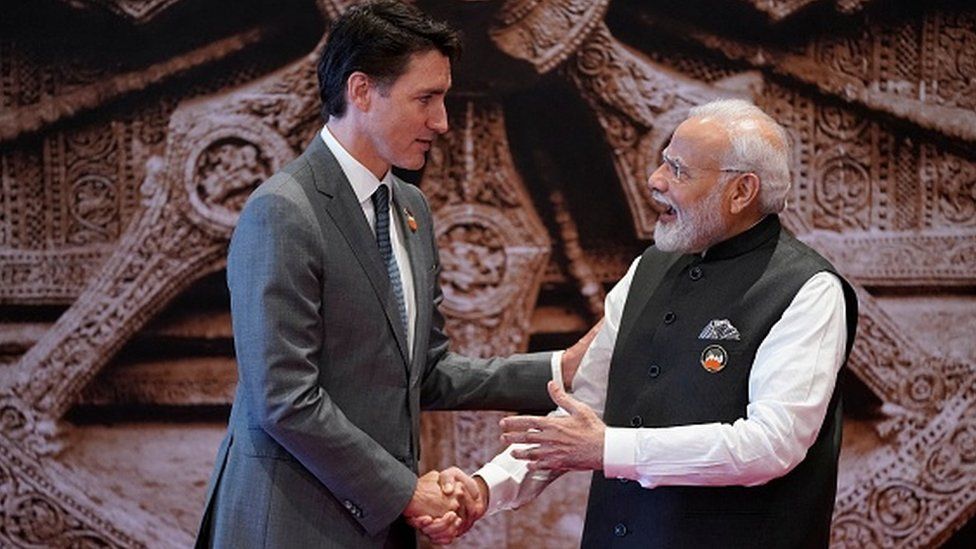India suspends visas for Canadians as row escalates
- Published
2 hours ago
- Published
GETTY IMAGES
Image caption,
Canada said it was investigating "credible allegations" linking India with the murder of the separatist leader
By Meryl Sebastian
BBC News, Cochin
India has stopped issuing visas to Canadian citizens amid an escalating row over the killing of a Sikh separatist on Canadian soil.
India said the temporary move was due to "security threats" disrupting work at its missions in Canada. Canada's visa services remain open in India.
Tensions flared this week after Canada's leader said India may have been involved in the 18 June killing.
India angrily rejected the allegation calling it "absurd".
Relations between the countries - key trade and security partners, and US allies - have been strained for months. Analysts say they are now at an all-time low.
ADVERTISEMENT
India's government swiftly made clear the suspension of visa services also "applies to Canadians in a third country".
"There have been threats made to our high commission [embassy] and consulates in Canada," a foreign affairs ministry spokesman in Delhi said. "This has disrupted their normal functioning. Accordingly [they] are temporarily unable to process visa applications."
He said: "India is looking for parity in rank and diplomatic strength between the diplomatic missions of the two countries. This is being sought because of Canadian diplomatic interference in our internal affairs."
Hours earlier Canada had announced it was reducing its personnel in India, saying some diplomats had received threats on social media.
"In light of the current environment where tensions have heightened, we are taking action to ensure the safety of our diplomats," a statement said.
The two countries have historic close ties - and much is at stake.
Canada has 1.4 million people of Indian origin - more than half of them Sikhs - making up 3.7% of the country's population, according to the 2021 census. India also sends the highest number of international students to Canada - in 2022, they made up 40% of total overseas students at 320,000.
According to Indian government statistics, about 80,000 Canadian tourists visited India in 2021, behind only the US, Bangladesh and UK.

Image caption,
Canadian PM Justin Trudeau (left) had a difficult meeting with Indian PM Narendra Modi in Delhi this month
The row burst into the open on Monday after Canada linked India with the murder of separatist leader Hardeep Singh Nijjar, a Canadian citizen who was shot dead in his vehicle by two masked gunmen outside a Sikh temple in British Columbia.
Prime Minister Justin Trudeau said Canada's intelligence agencies were investigating whether "agents of the government of India" were involved in the killing of Nijjar - who India designated a terrorist in 2020.
India reacted strongly, saying Canada was trying to "shift the focus from Khalistani terrorists and extremists" who had been given shelter there. The Indian government has often reacted sharply to demands by Sikh separatists in Western countries for Khalistan, or a separate Sikh homeland.
The Khalistan movement peaked in India in the 1980s with a violent insurgency centred in Sikh-majority Punjab state.
It was quelled by force and has little resonance in India now, but is still popular among some in the Sikh diaspora in countries such as Canada, Australia and the UK.
BBC News India is now on YouTube. Click here to subscribe and watch our documentaries, explainers and features.
